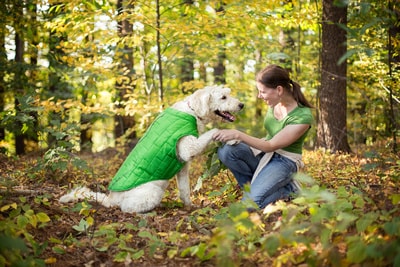When New Medication Is Introduced, Should You Try It for Your Dog?

As a consumer advocate, the Senior Dogs Project takes on the role of giving you information to help you evaluate what's good for your dog. When it comes to medication, this means looking at benefits versus risks, because all medication comes with side effects. As an example, when Rimadyl was introduced, many incidents of fatal side effects occurred. The Senior Dogs Project helped in the effort to alert consumers and, ultimately, to have the US Center for Veterinary Medicine issue a mandate to the manufacturer for cautionary labeling.
Because arthritis pain is a major factor in many senior dogs' quality of life, it has become a major focus of animal drug companies. Since Rimadyl was introduced, many additional formulations have come on the market. One of the latest is Librela, introduced in November 2023. This drug has gotten some very good reviews from both senior dog guardians and veterinarians.
We like the thoughtful article about this new canine arthritis drug published in The Whole Dog Journal. In addition to discussing the drug itself, the article points out that, in deciding whether to give it to your dog, you should know that:
"Often a drug needs to be given to a very large pool of patients before all the adverse side effects or contraindications – conditions under which the drug poses more harm than good – are discovered."
Even If It's Not "Adopt a Senior Pet Month" -- you can still adopt a senior dog.....

Rememberiing Bob Barker
From the New York Times:
 "Bob Barker, the longtime host of the television game show 'The Price Is Right' who died on Saturday, made animal rights advocacy a hallmark both of his career in show business and his life after retirement.
"Bob Barker, the longtime host of the television game show 'The Price Is Right' who died on Saturday, made animal rights advocacy a hallmark both of his career in show business and his life after retirement.
"Over decades as the host of the longest-running game show in American television history, Mr. Barker, beginning in the 1980s, used his bully pulpit to remind millions of viewers to 'help control the pet population; have your pet spayed or neutered.' "
We;re certain that it's thanks to Bob Barker that the euthanasia rate at shelters has decreased. BUT work still needs to be done to get the message out -- ADOPT DON'T SHOP!!!
August 26, 2023, Was National Dog Day!!

National Dog Day is a day set aside to recognize and celebrate the many ways that dogs play a part in and benefit our lives. It's a time to be reminded that they, "...save lives, keep us safe and bring comfort. Dogs put their lives on the line every day...for personal protection, for law enforcement, for the disabled, for our freedom and safety by detecting bombs and drugs and pulling victims of tragedy from wreckage. " But, due to circumstances beyond their control, dogs can wind up homeless and in need of rescue and rehoming. NDD is a day to focus on both the exceptional worthiness of dogs AND on spreading the word to adopt from shelters and rescue groups -- and NOT to buy a dog from a pet shop or breeder. ADOPT DON'T SHOP!!
July Is National Pet Loss Prevention Month!
Ooops! We missed announcing at the beginning of July that it's now National Pet Loss Prevention Month......but it's never too late to take measures to ensure your dog doesn't get lost. Why is July designated for this purpose?? Because everyone is spending more time outdoors, resulting in more crowds and more traffic, and the days are longer, increasing the number of hours of dusk -- where it's harder to see and easier to get lost.
Your senior may have vision as well as hearing loss.....and summer is also a time for scary fireworks, so that, even if there's hearing loss, a very loud bang and the percussive accompaniment can cause a dog to bolt and run.
Keep your senior on a leash! It's the best way to prevent becoming separated and lost or injured.

Search for free or low cost pet support services like veterinary care, pet food pantries, temporary pet care and more…… Visit pets.findhelp.com
If you or someone you know is facing the challenges of increased prices related to care of a companion animal, it's possible to find help by going to the petsfindhelp.com website and entering a zipcode.
Statement from the website:
"This platform changes the game for struggling pet owners, who may have thought their only option was to give up a loved pet to a shelter. Human Animal Support Services created this free, first-of-its-kind platform to make accessing pet support services easy."

A Shelter That Doesn't Give Up on Senior Dogs
Memphis, TN -- 3/27/2023 -- Eight-year-old "Star" wound up at Memphis Animal Services earlier this year, when his guardian could no longer care for him. Fortunately, the shelter director, Alexis Pugh, has a policy of assuming that there will be someone "out there" with a heart big enough to adopt a senior dog. So, Star was installed in her office, where he happily assisted in the daily routine for three months while Pugh and her staff got the word out about him. Sure enough, a wonderful adopter showed up for him. Read more and see the video of his send-off....

Why the Senior Dogs Project Loves WoofTrax
WoofTrax is an app for your phone that rolls charity, good human health and good dog health into one. It’s easily installed on your phone. When you enter information into your profile (e.g., your name, dog’s name, etc.), you’ll have the opportunity to designate an animal charity of your choice – such as your local shelter or rescue group. Each time you walk your dog, you begin by logging into the app. You’ll see your route on the map. When you’ve finished your walk, the app registers a donation for the organization you’ve named and also keeps a record of how far you’ve walked. It’s amazing how quickly the miles (and the donations and the health benefits) add up! At the Senior Dogs Project, in less than six months, we logged over six hundred miles!! We often flash our mileage history among friends and other dog walkers to impress them (and to suggest they also participate in the WoofTrax program to support their favorite animal charity). Here’s the link with info: https://www.wooftrax.com/
Comfort during Times of Stress
January 29, 2023 -- Tyre Nichols death at the hands of a specialized "Scorpion" unit of the Memphis, TN, police department has brought deep sadness to many. How can we deal with this and other events in our country and the world that cause us to feel not only sad, but anxious, afraid, or threatened? Many of us turn to our dogs -- and for good reason. "Therapy dogs" have been shown in scientific studies to help.
"To dog lovers, the use of therapy dogs is a no brainer. Studies have shown that simply petting a furry friend can raise levels of serotonin, dopamine and oxytocin, which helps reduce feelings of stress, anxiety and depression – emotions many people experience when a loved one dies. " -- from an article in Therapy Dogs Bring Comfort in Times of Mourning,:

Your dog might not be designated officially as a "therapy dog," but we guarantee that there's lots of comfort ready to be accessed, right there at your side.
Rabies Challenge Fund Results Are In

Is it really necessary to re-vaccinate for rabies every three years, as is required by many states? Veterinarians and dog guardians began to question these state laws because they observed the unwanted side-effects, including various cancers that appeared to be directly correlated to adminstration of the vaccinations.
When it comes to senior dogs, in many cases they have been re-vaccinated many times over the years. Veterinarians and dog guardians began to ask, was it really necessary to revaccinate? Or could it be possible that the dogs were still protected, even after more than three years? And could that level of protection be determined by a test known as a "titer"? The Rabies Challenge Fund, organized and funded by veterinarians and dog lovers, was formed to investigate.
Results of the research on rabies vaccinations are finally in. They are reported in Dogs Naturally magazine.
In sum, the results are:
- Rabies vaccine may induce a duration of immunity well beyond 3 years in dogs
- Antibody is the most important protective factor against rabies virus
- Anamnestic responses to virulent challenge can be seen even without protective titers in previously vaccinated dogs
- Protection persists without annual or triennial re-vaccination
- Antibody testing of individual pets can be an excellent indicator of protection or lack thereof … although further studies are needed to determine a protective antibody threshold for vaccinated dogs.
The magazine reports: "Clearly the results were not what we’d all hoped. The rabies vaccination laws won’t be changing anytime soon."
You can get a medical exemption from state-required revaccination laws if your dog's health could be compromised by administering the vaccination. Information from the American Veterinary Medical Association here.
Since laws change, you should check with your veterinarian about the most current regulations in your state.
